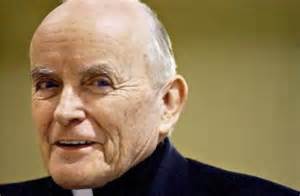
Editor’s note: Among many other things, Father Andrew Greeley, who passed away last week, was a champion of Catholic schools. According to the New York Times obituary, “His research debunked the received view at the time that Catholics had low college attendance rates. He found instead that white Catholics earned bachelor’s degrees and pursued advanced degrees at higher rates than other whites, and he attributed their success to the quality of education in parochial schools, a controversial assertion in a time of public school ascendancy.” As John E. Coons writes in this post, the school choice movement also considered him one of its own.
Andrew Greeley was a friend and a puzzle. We first met in 1978 at a conference of the National Catholic Educational Association. James Coleman – that other splendid Chicago sociologist – had written the introduction to a new book of Steve Sugarman’s and myself; it was about school choice, and Coleman thought Andy and we should connect. Sporadically, over the next 30 years we enjoyed a rather lively reciprocity.
I had known Greeley’s work on Catholic schools and their role in the larger civic order. His 60’s book with Peter Rossi – “The Education of Catholic Americans” – was suggestive to anyone hoping to liberate the inner-city child from a public system that only helped secure his permanent dependence. Sugarman, William Clune, and I took added confidence in arguing (1968, 1970) that any constitutional solution to our warped and irrational distribution of support among public schools not foreclose the state’s assistance to families to make their own choice – including private religious schools.
In respect of school choice Greeley contributed principally – but very effectively – as an intellectual source. His work in the 80’s with Michael Hout on the social picture of life in Catholic schools and their intellectual and social payoff was, I think, a constant resource for those more on the front line. He was emotionally committed to the institution and publicly regretted what he saw as the shameful and unnecessary closing of parish schools in Chicago. All choiceniks saw him as an ally. If not a spear carrier, he was the ideal quartermaster. His relative distance from politics preserved his academic stature, and – prudently – he stayed in the intellectual background and fed the troops.
Greeley was, in one dimension, thoroughly gregarious. He was generous, open, and funny. His table stories were delightful; his laugh infectious. He loved kids. He also enjoyed jibing and even collaborating with thinkers who were at a certain intellectual distance from him, especially, perhaps, Jews. His book with Rabbi Jacob Neusner, “Common Ground,” is a classic of good humor and a vivid perception of shared appreciation of God’s work – without giving away the Catholic store. I came to suspect, by contrast, that he suffered Protestants less gladly, but – at least in Jim Coleman’s case – it was very gladly.
He seemed to have more difficulty admiring some Catholics, especially prelates who had less wide-minded hopes for the Church. Still he was greatly admired by recent cardinal archbishops who reigned over Chicago. My sense is that they – like most of us – were moved by his deep and genuine love for the Church and especially for the nobodies who live at its heart. His torrent of religious reflections reveals a mind that, despite its immense horsepower, could focus on the simple and the holy. Andy was in that game for the duration; I think he won.
Greeley had his enemies. Some, I suspect, he had simply left perplexed and, perhaps, less appreciated than they expected. I fear that he himself could take offense too easily and cut whatever chord was in the making. He took special umbrage to Hans Küng whom I would have thought congenial. So, yes, he was a bit quirky – how odd in such a great man as Andy!
I think his fiction was a kind of working vacation from his vocation. God, he saw, lurks everywhere. He must have loved Chesterton, as I still do, for demonstrating that the divine mind has a very earthy partnership in the affairs of daily life.
Greeley has been profoundly missed by us since his tragic injury. I see no one to fill the vacuum – whatever it was he meant to us is gone and unlikely to be replaced. But we can do this: We can remind ourselves and our children of the possible good; and Andy is a splendid reminder.


